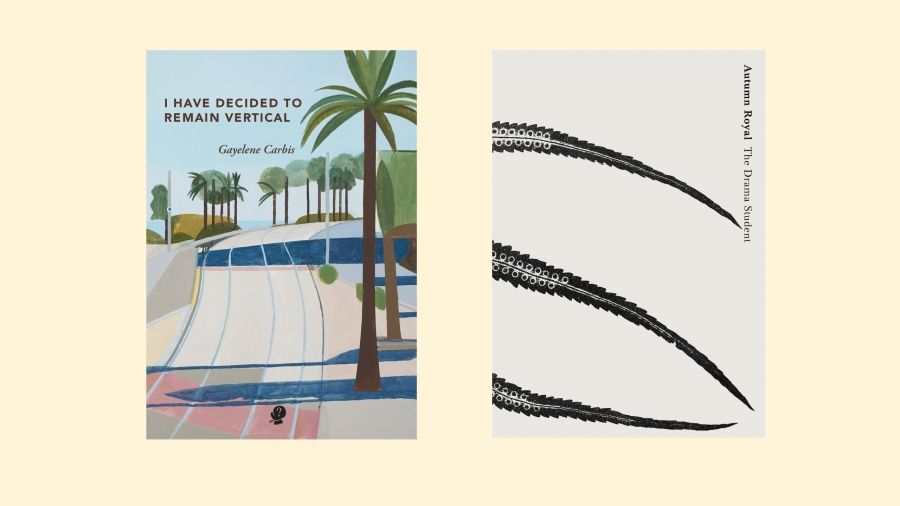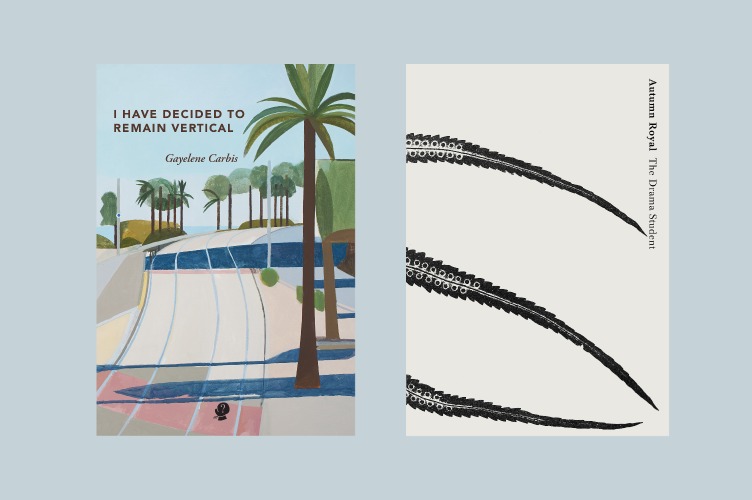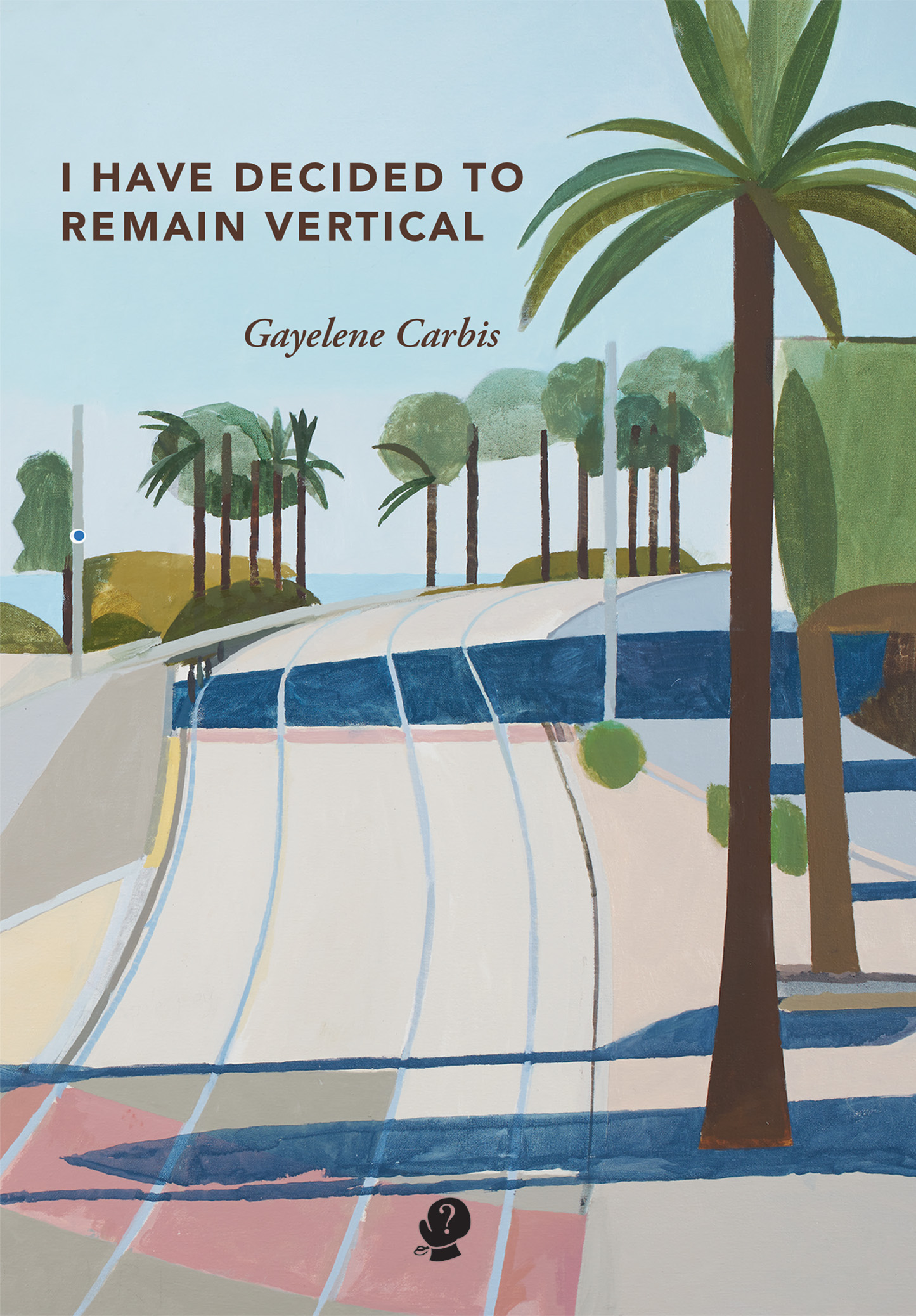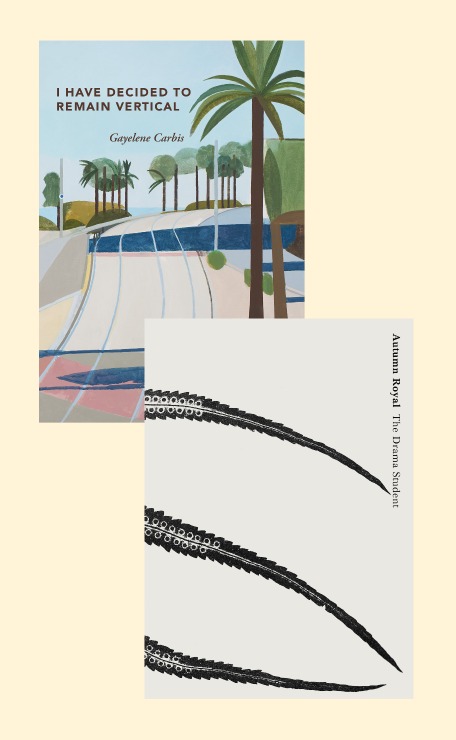
- Free Article: No
- Contents Category: Poetry
- Review Article: Yes
- Article Title: Striking parallels
- Article Subtitle: Ekphrasis and the body
- Online Only: No
- Custom Highlight Text:
There are striking parallels between I Have Decided to Remain Vertical by Gayelene Carbis and The Drama Student by Autumn Royal. Both are new collections from experienced Melbourne poets; both think through women’s places in social and material contexts; both display an intense interest in material things and material places; both engage with works of art beyond their own pages.
- Featured Image (400px * 250px):

- Alt Tag (Featured Image): Chris Arnold reviews 'I Have Decided to Remain Vertical' by Gaylene Carbis and 'The Drama Student' by Autumn Royal
- Book 1 Title: I Have Decided to Remain Vertical
- Book 1 Biblio: Puncher & Wattmann, $25 pb, 108 pp
- Book 1 Cover Small (400 x 600):

- Book 1 Cover (800 x 1200):

- Book 2 Title: The Drama Student
- Book 2 Biblio: Giramondo, $25 pb, 80 pp
- Book 2 Cover Small (400 x 600):

- Book 2 Cover (800 x 1200):

Carbis recycles phrases as if they were musical themes – motifs keep popping up. ‘The Weight of Words in Our Hands Like Water’, for example, appears as the title of a 2015 poem in which the speaker is upset at a comment from her partner. The relationship descends into violence by the time a different poem – also ‘The Weight of Words in Our Hands Like Water’ – appears in Anecdotal Evidence. The phrase appears again in I Have Decided to Remain Vertical: ‘The weight of words in our hands like water / You stole those words from me I said you were welcome to them / now I’m not so sure.’
This passage shows how Carbis carefully constructs poems around absences: an absent father, a mother with cancer, departed friends and lovers. The apostrophe – the ‘you’ of this collection – is consistently tied to absence. The vagueness of the poetic ‘you’, which so often lets the device down, heightens the hazy presence that haunts every aspect of the speaker’s world.
I Have Decided to Remain Vertical isn’t consistently grim, however; there are many moments of joy and kindness. Indeed, the acute loss in Carbis’s poems stems from the loss of a relationship’s connection and security. Under another title reprised from Anecdotal Evidence, ‘The Good Breast’, Carbis writes of her mother,
it’s supposed to come
naturally but does it a girl unschooled alone in a bed but still love
is not pure that has no boundaries my mother’s milk must have dried
up and withered away and died but she never cried no use crying
over spilt milk she’d say and she took me home and loved me to death
Not all of these poems are effective. ‘The Object of The Father All at Sea’ has a touching set-up and ending, but its recounting of a Simpsons episode feels more synoptic than necessary.
I Have Decided to Remain Vertical and The Drama Student meet in the gallery: ekphrastic responses are prominent features of both collections. Where most of Carbis’s ekphrastic poems are responses to paintings, Autumn Royal ranges widely, writing on painting, sculpture, and drama. A particularly interesting poem, ‘Nightgown Slips’, is part of a collaboration between Royal and artist Hannah Gartside. ‘Nightgown Slips’ responds to an installed work called ‘Fantasies’, in which empty nightgowns retain their worn shape. Thinking through the nightgown as spectacle – ‘silk gowns / will also be shaped with a gaze’ – and its association with a demure femininity, Royal attempts to restore the nightie’s honesty and assertiveness:
the way language
immeasurably clings even when whispered
or delicately cut – as if authenticity
is assumed by a volume of expression –
yet sincerity (like wit) is often unseen
and unable to be ripped from the wearing –
Royal, like Carbis, is focused on the body as the site of experience. Elsewhere in The Drama Student, ‘she sells these things so she can put things / into the thing that is her body pulling / the wagon.’
Where these poets separate is the work they ask of the reader. Both collections are thoughtful and demand attention, but Royal asks more of her reader in general: the fragment of ‘Nightgown Slips’ above shows Royal’s complex interplay of image and abstraction. For example, ‘In commiseration of spiders’ begins, ‘The trilogy is you and me and the lack of you.’ This ‘trilogy’ of broad concepts also refers to a physical object; the object as metaphor for the speaker’s self: ‘I’m queried about why I’ve hardened into such a skillet / with three stilty legs.’ The Drama Student is surer of her capacity to work with difficulty and abstraction than Royal’s She Woke & Rose (2016).
The Drama Student and I Have Decided to Remain Vertical are an interesting pair of books to read together. Aside from their common concerns with ekphrasis, and with thinking about identity in relation to others, the poets are doing similar work on the edges of poetic form. I am particularly interested in the books’ engagement with prose poetry. Good examples are Carbis’s ‘Your Mind on the Dead’ and Royal’s five page ‘encore’, ‘Soliloquy’. The typesetting makes it hard to tell if these are long-lined poems or left-justified blocks of prose (for Carbis, her left-and-right justified poems suggest the former). The poems compound this confusion with their use of narrative and expansive language to retain the quality of prose writing. Autumn Royal does a particularly good job of this type of poem, leaving much of the narrativising to the reader:
Although I had passed
a public toilet on my way to the audition, I skipped the opportunity
as my manager advised my performance required an expression
of concern and I needed to look authentic.
In keeping with its title, The Drama Student includes several monologues spoken by actor characters, like the one above. These are weird and thoughtful reflections on what it means to adopt a role, and what that might mean for the construction of self. A range of social behaviours are staged as artifice to recontextualise them, and these poems make a fascinating sequence on their own.
I Have Decided to Remain Vertical and The Drama Student are accomplished and interesting volumes, each from a poet with a distinct way of expressing her perspective.



Comments powered by CComment